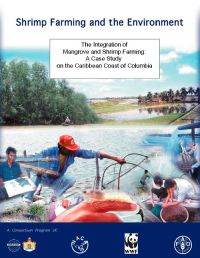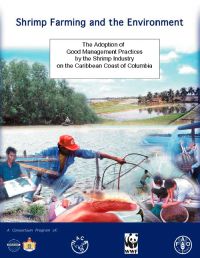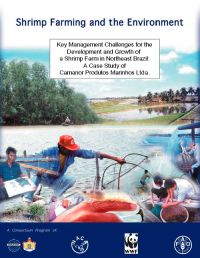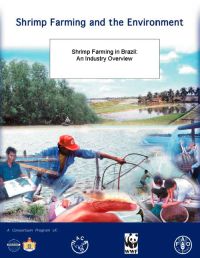Shrimp aquaculture has been accused of threatening mangrove forests worldwide. Mangrove and shrimp ponds are known to have mutually supportive functions. Mangrove wetlands can treat effluents from shrimp ponds effectively by removing suspended solids and nutrients. This activity can be expected, in turn, to enhance mangrove productivity. This report describes an integrated mangrove wetland–shrimp farm operating in Colombia since 1996. At this site, shrimp farm effluent is recirculated through an 120 ha mangrove area.
This report discusses the recent history of shrimp aquaculture along the Caribbean coast of Colombia, with a focus on effective management practices that have been implemented since the mid-1990s. While the primary reason for using different practices has been preventing outbreaks of shrimp diseases, many such practices provide environmental benefits as well. Examples include reducing the use of water and ensuring that effluent entering natural water bodies is at least as clean as the intake water.
This case study discusses the main lessons for management practices learned at the shrimp farm Camanor, in Rio Grande do Norte, Brazil. Since it was founded in 1982, the farm has yielded data that allow the lessons and insights to be drawn. This case documents the most important lessons learned by Camanor during the past 18 years. The most important challenges before the shrimp aquaculture industry involve developing better practices and implementing industry wide standards that are more sustainable.
The purpose of this study is to assess the development of the shrimp farming industry in Brazil, identifying past obstacles and key incentives for its expansion. The shrimp industry has taken longer to develop in Brazil than in other countries. Despite favorable conditions, it is only recently that successful efforts are consolidating. This report analyzes the main factors that have inhibited the development of the industry and describes the sector's current characteristics.
This extension manual summarises farm level risk factors and practical management practices that can be used to reduce risks of shrimp disease outbreaks and improve farm production. The recommendations are based on a study conducted in Andhra Pradesh, India. The publication is therefore of particular relevance to Andhra Pradesh, but many recommendations are still of use to farmers from other areas.



